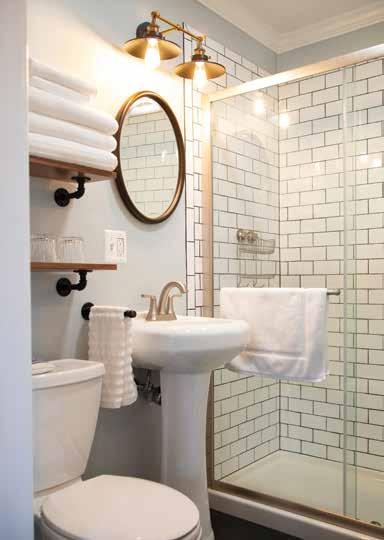
4 minute read
atHome with History: The Burrell House
PHOTOS FROM TOP LEFT, CLOCKWISE:
Signs on the front of the Burrell House on 117 Washington Street, Keene, New Hampshire.
Advertisement
A sitting room in the renovated bed and breakfast.
One of the renovated bedrooms at the Burrell House.
The Carriage House, which was almost demolished; now refurbished, painted and standing tall.

NEXT PAGE: One of the nine new bathrooms installed in the bed and breakfast.
taxation,” he says, which benefits both the community and people like him who want to restore older properties to their former glory. “This is a really solid program,” he says. “You are adding to the city’s tax roll for the long term and giving a business owner the chance to get a business up and running.” Gorman says if the building was being assessed at its postrenovation value, he might not have been able to pull it off, especially right now, with the pandemic limiting the use of the building. “We were figuring out as we went, but like everybody, we weren’t figuring on this,” he says. The building is ready for guests, notes Gorman, but they’re starting slowly, offering it to friends of the family just to get a feel for the business, so they are


233 Monadnock Hwy Swanzey, NH 03446 603-357-5874
ready when the pandemic is officially over. “We don’t want to get this business off on the wrong foot,” he says. Taking it slow also gives him time to decide what to do with the renovated carriage house. “I was close to tearing it down, but it was too beautiful,” says Gorman. He envisions it as a sort of event space for people renting the Burrell House, a place to host wedding dinners, birthday parties or graduation celebrations. Burrell House’s website is up and running, but the Gormans won’t be taking regular reservations until well into 2021. To learn more about the Burrell House, which was added to the New Hampshire State Register of Historic Places last year, visit www.burrellhouse.com.


Robert Audette writes from Swanzey, New Hampshire.
Comfort, Care and Support that comes to you.
Imagine being able to watch birds from your own window in the comfort of home, surrounded by family.
In coordination with your physician, our team of Hospice professionals provides the end of life support you and your family need so you can remain at home — skilled nursing, help with personal care needs, pain and symptom management, caregiver respite, spiritual care counseling, and so much more.

312 Marlboro Street, Keene | | 33 Arborway Charlestown 9 Vose Farm Road, Peterborough HCSservices.org | | 603-352-2253 Hospice at HCS… Doing more than you can Imagine
How to Properly Dispose of Disposable Masks
Let’s discuss mask etiquette. Don’t worry, this is not an article discussing whether or not you should wear a mask; we will leave that up to others. Instead, this article is about proper handling of your disposable mask when you are done with it. One-time use masks are NOT to be placed in the recycle bin, on the ground or flushed down the toilet. Masks should be securely thrown in the trash can. Here’s why:
1. Disposable Masks are NOT Recycleble.
Although some face masks may seem like they are made of paper, they are commonly made of synthetic fabrics like polypropylene and polyester. Therefore, tossing masks in your paper recycling can be a source of contamination that solid waste facilities and recycling companies will ultimately need to manage, costing time and money.
2. Masks on the Ground = Litter.
If you drop your mask, pick it up. If there is no trash can where you are, hold onto your mask until you get home and throw it away. When you leave your used mask on the ground, not only are you littering, but you also increase the chance that someone or something will come into contact with your germs. Under normal circumstances this is just plain disgusting, but with COVID-19, it is particularly risky.

3. Masks are not Flushable.
The material in these masks is not dispersible, which means that no matter how many times a mask is swirled down the toilet, through the pipes and into either your septic system or sent to a wastewater treatment plant, it will not break down like toilet paper. Flushing masks can cause clogged toilets, drains and malfunctions at wastewater treatment plants. Please dispose of your masks properly in the trash can with the rest of your solid waste. And when the bag is full, make sure you tie it tightly so the waste stays contained.
This article is courtesy of Greenworks, a newsletter put out by the New Hampshire Department of Environmental Services.





